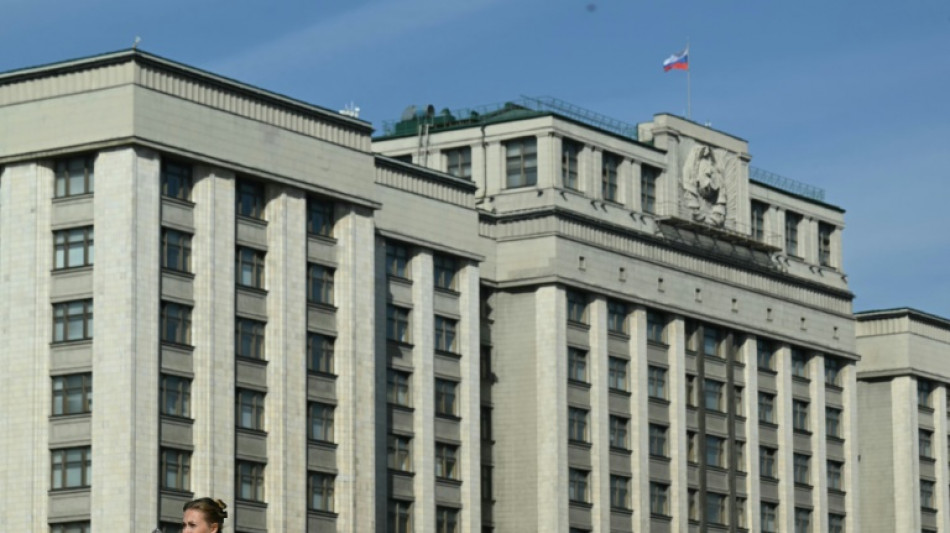
-
 Afghan data breach unmasked UK spies, special forces: reports
Afghan data breach unmasked UK spies, special forces: reports
-
US health experts reassess hormone replacement therapy risks

-
 France court orders release of Lebanese militant after 40 years in jail
France court orders release of Lebanese militant after 40 years in jail
-
Goodbye 'Downton Abbey' auction and UK exhibition announced

-
 Soaked Scheffler battles elements to make solid British Open start
Soaked Scheffler battles elements to make solid British Open start
-
Ons Jabeur announces break from tennis 'to rediscover joy of living'
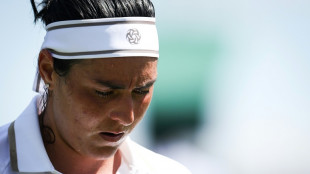
-
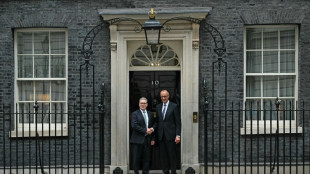 UK, Germany vow to tackle people smuggling gangs
UK, Germany vow to tackle people smuggling gangs
-
Zuckerberg settles lawsuit over Cambridge Analytica scandal
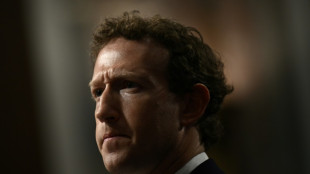
-
 Global markets rise as Trump weighs future of Fed boss
Global markets rise as Trump weighs future of Fed boss
-
Syria troops quit Druze heartland after violence leaves over 500 dead

-
 TikTok Germany moderators raise alarm over layoff plans
TikTok Germany moderators raise alarm over layoff plans
-
Pogacar retakes Tour de France lead in crushing mountain win

-
 Women's marathon world record holder Chepngetich suspended for doping suspicions
Women's marathon world record holder Chepngetich suspended for doping suspicions
-
EU readies retaliatory list targeting US services

-
 'Back in love': MotoGP champion Martin stays with Aprilia
'Back in love': MotoGP champion Martin stays with Aprilia
-
Israeli strike on Gaza's only Catholic church kills three

-
 'I'm not an old guy': Usyk says age won't matter in Dubois bout
'I'm not an old guy': Usyk says age won't matter in Dubois bout
-
Fan energy key for Swiss in Euros clash with Spain, says Maritz

-
 'Like a dream': Druze reunited across Golan Heights buffer zone
'Like a dream': Druze reunited across Golan Heights buffer zone
-
US health experts to reassess hormone replacement therapy risks

-
 Scheffler makes bright British Open start before McIlroy takes centre stage
Scheffler makes bright British Open start before McIlroy takes centre stage
-
El Salvador rights group says forced into exile by Bukele crackdown

-
 Shock and sadness as Tomorrowland music festival opens after fire
Shock and sadness as Tomorrowland music festival opens after fire
-
Napoli sign Dutch international forward Lang

-
 Westwood rolls back years on British Open return
Westwood rolls back years on British Open return
-
UK to lower voting age to 16 in general elections

-
 Sri Lanka returns orphaned elephants to the jungle
Sri Lanka returns orphaned elephants to the jungle
-
Russian deputies back fines for clicking on 'extremist' content
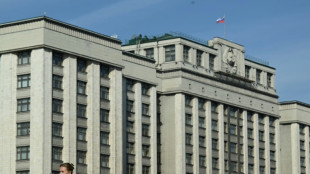
-
 Ukraine's new PM: a deal-maker as head of wartime government
Ukraine's new PM: a deal-maker as head of wartime government
-
Britain seeks German help against people smuggling gangs on landmark Merz visit
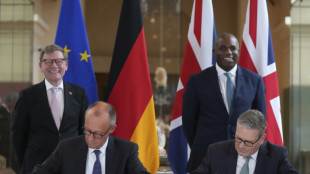
-
 Fake AI videos of R. Kelly, pope spread cult of Burkina junta chief
Fake AI videos of R. Kelly, pope spread cult of Burkina junta chief
-
Israeli strike on Gaza's only Catholic church kills two

-
 Rare Gandhi portrait smashes estimate to sell for nearly £153,000
Rare Gandhi portrait smashes estimate to sell for nearly £153,000
-
Syria troops quit Druze heartland leaving bodies on streets

-
 South Africa warns global turmoil threaten development goals
South Africa warns global turmoil threaten development goals
-
Novartis first half net profits up 29 percent

-
 Strike on Gaza's only Catholic church injures several people
Strike on Gaza's only Catholic church injures several people
-
Iraq shopping mall fire kills more than 60

-
 Taipei holds air raid drill to prepare for Chinese attack
Taipei holds air raid drill to prepare for Chinese attack
-
Migration, defence on agenda for German chancellor's first UK visit

-
 Swatch profits plunge on weak China sales
Swatch profits plunge on weak China sales
-
Kluivert's Indonesia to face Saudi Arabia in World Cup qualifying

-
 EasyJet boss hits out over French air traffic walkouts
EasyJet boss hits out over French air traffic walkouts
-
Stocks extend Wall St gains, 7-Eleven owner plunges

-
 Wallabies Tupou, Daugunu added to Pasifika squad for Lions clash
Wallabies Tupou, Daugunu added to Pasifika squad for Lions clash
-
New Zealand, France make mass changes to sides for third Test

-
 54 people killed in 24-hours of heavy monsoon rain in Pakistan
54 people killed in 24-hours of heavy monsoon rain in Pakistan
-
'I thought I was going to die': sailor recounts Huthi attack in Red Sea

-
 Three dead as South Korean region hit by most rain in 120 years
Three dead as South Korean region hit by most rain in 120 years
-
Lions leave out Farrell, Pollock for first Australia Test


Russian deputies back fines for clicking on 'extremist' content
Russian lawmakers on Thursday advanced a bill that would outlaw opening or searching for content online judged "extremist", such as songs glorifying Ukraine and material by feminist rock band Pussy Riot.
Critics say the planned law, which has drawn rare criticism from across Russia's political spectrum, would stifle internet freedom.
Russian authorities already block access to thousands of websites accused of hosting "extremist" content.
The latest proposed legislation threatens fines of up to 5,000 rubles ($64) on anyone found to have deliberately searched for or gained access to material listed as extremist by the justice ministry.
More than 5,000 entries are on the list, including web pages, political slogans, books, artworks and music albums.
Among them are songs glorifying Ukraine, blog posts by feminist rock band Pussy Riot and information on the Wikipedia page for dynamite.
Deputies in the lower house State Duma backed the bill by 283 votes to 22 in its second reading.
It is not clear whether the bill has the support of the government.
The Kremlin said the proposal needed "more detailed explanations" to allay people's concerns.
"I am not familiar with the initiative by the deputies," Kremlin spokesman Dmitry Peskov said in response to a question from AFP.
- 'Attack on basic rights' -
The bill requires three readings and approval by Russia's upper house before President Vladimir Putin can sign it into law.
During Thursday's second reading, lawmaker Alexander Teterdinko of the governing United Russia party said the legislation would only affect those who "deliberately" search for extremist material.
"That is to say, if you Google something and material appears in the search results, but you do not click on it, do not read it, do not use it in any way... you will not fall under this article," he said.
Other lawmakers, however, expressed concern over the apparent lack of safeguards.
The bill was originally about tightening regulation over shipping clerks, but evolved as lawmakers inserted amendments.
Deputy State Duma Speaker Vladislav Davankov called components of the bill an "attack on the basic rights of citizens". Russia's internet safety tsar warned the legislation would stifle her department's work.
The bill would also ban advertising for virtual private networks (VPNs) and impose fines for transferring SIM cards to another person, both ways of browsing with more privacy.
Margarita Simonyan, the editor-in-chief of pro-Kremlin broadcaster Russia Today, said the legislation would make it impossible to investigate and expose extremist groups.
"I hope there will be amendments," she said on Telegram.
K.AbuDahab--SF-PST
